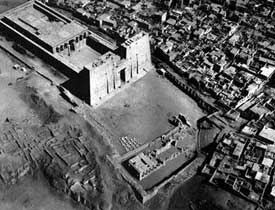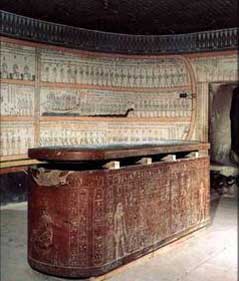Gurdjieff in Egypt
Egypt and Christianity

Discussing
his search in Egypt for the source of esoteric knowledge, Gurdjieff
said, "It will seem strange to many people when I say that
this prehistoric Egypt was Christian many thousands of years before
the birth of Christ." Of his discoveries, he said, "The
Christian church, the Christian form of worship, was not invented
by the fathers of the church. It was all taken in a ready-made form
from Egypt, only not from the Egypt that we know but from one which
we do not know. This Egypt was in the same place as the other but
it existed much earlier. Only small bits of it survived in historical
times, and these bits have been preserved in secret and so well
that we do not even know where they have been preserved."
— P.D. Ouspensky, In Search of the Miraculous

The towering entrance pylons seen here at the Temple of Edfu,
the columned halls, the sanctuary of the Naos, all have their analogs
in the design of Christian churches.
Gurdjieff
said that Egyptian "'schools of repetition' were taken as a model
for Christian churches—the form of worship in Christian churches
almost entirely represents the course of repetition of the science
dealing with the universe and man. Individual prayers, hymns, responses,
all had their own meaning in this repetition as well as holidays and
all religious symbols, though their meaning has been forgotten long
ago."
— P.D. Ouspensky, In Search of the Miraculous
"The question of the origin of the Christian church, that is of the Christian temple, is much more interesting than we think. To begin with, the church and worship in the form which they took in the first centuries of Christianity could not have been borrowed from paganism because there was nothing like it either in the Greek or Roman cults or in Judaism. The Jewish synagogue, the Jewish temple, Greek and Roman temples of various gods, were something quite different from the Christian church which made its appearance in the first and second centuries. The Christian church is—a school concerning which people have forgotten that it is a school."
— P.D. Ouspensky, In Search of the Miraculous

The tombs were "transition sites" in the soul's journey from the Here to the Hereafter. The soul and the carnal body were thought to have a very close connection and so if the body was preserved through mummification then this would stabilize the soul's journey from the concrete visible world to that of the abstract and invisible. Thus, the tombs were filled with personal belongings, prayers and spiritual instructions for a safe passage for the soul from its embodied to its disembodied state.
About this 'disembodied' state, Gurdjieff said, "According to an ancient teaching, traces of which may be found in many systems, old and new, a man who has attained the full development possible for man, a man in the full sense of the word, consists of four bodies.
Only the man who possesses four fully developed bodies can be called a 'man' in the full sense of the word. This man possesses many properties which ordinary man does not possess. One of these properties is immortality. All religions and all ancient teachings contain the idea that, by acquiring the fourth body, man acquires
immortality; and they all contain indications of the ways to acquire the fourth body, that is, immortality."
Ordinary man has only the physical body. The physical body dies and nothing is left of it. The physical body is composed of earthly material and at death it returns to earth. It is dust and to dust it returns. It is impossible to talk of any kind of 'immortality' for a man of this sort.

But if a man has the second body, this second body is composed of material of the planetary world and it can survive the death of the physical body. It is not immortal in the full sense of the word, because after a certain period of time it also dies. But at any rate it does not die with the physical body.
If a man has the third body it is composed of material of the sun and it can exist after the death of the 'astral' body.
"The fourth body is composed of material of the starry world, that is, of material that does not belong to the solar system, and therefore, if it has crystallized within the limits of the solar system there is nothing within this system that could destroy it.
This means that a man possessing the fourth body is immortal within the limits of the solar system."
— P.D. Ouspensky, In Search of the Miraculous

